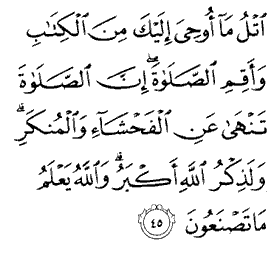Bond with God, Best Candidate, Cult of Community
Issue 833 » March 13, 2015 - Jumada Al-Awwal 22, 1436
Living The Quran
Bond with God
Al-Ankabut (The Spider) - Chapter 29: Verse 45
 "Recite what has been revealed to you of the book, and attend regularly to your prayer; for prayer restrains people from loathsome deeds and from all that is evil. To remember God is greater still. God knows all that you do."
"Recite what has been revealed to you of the book, and attend regularly to your prayer; for prayer restrains people from loathsome deeds and from all that is evil. To remember God is greater still. God knows all that you do."
The Prophet (peace be upon him) is told to recite the Book that has been revealed to him because it is his means of advocating God's message. It is a divine sign, one inseverable from the great truth reflected in the creation of the heavens and the earth. He is also told to attend regularly to prayer, because when it is repeatedly offered in the proper manner it becomes a bond with God. Prayer is an act of purification and dedication which cannot fit with the filth of evil and loathsome deeds. The Prophet is quoted as saying: "Whoever offers a prayer and it does not prevent him from loathsome and evil deeds will only take himself further away from God" [Related by al-Tabari]. This refers to the person who has not attended properly to his prayer; he has rather offered it mechanically. When prayer is properly attended to, it is a form of remembrance of God: "To remember God is greater still." It is greater than all. Greater than any motivation, inclination, or other form of devotion.
"God knows all that you do." Nothing escapes Him, and nothing blurs His eye. All mankind will return to Him when He will requite all in accordance with their deeds.
Compiled From:
"In the Shade of the Quran" - Sayyid Qutb, Vol. 13, p. 326
Understanding The Prophet's Life
Best Candidate
The best candidate, at whatever political level, is the one who brings together the three most essential qualities when it comes to seeking a political mandate (which essentially consists of serving the community): integrity, ability, and willingness to serve. It is for every citizen to evaluate, consider, and finally decide, case by case, in favour of the best, or sometimes the "least bad."
We should not necessarily choose a candidate who is a member of "the community": one can be a Muslim and dishonest, politically incompetent, and more concerned with titles than with serving people. To choose such a person, for example, would be a betrayal of principles. Did not the Prophet (peace be upon him) say: "Anyone who appoints to a position an individual from a community when there is someone else more competent betrays God, his Prophet, and all Muslims"? [Hakim] The choice should be based on the balance between the three qualities referred to earlier and not on the religion or community membership of the person.
In the two situations, the act of electing and the hope of being elected, a civic ethic operates in the same way and makes the same demands: it calls upon responsible and independent individuals to know their principles, ethics, and environment, to decide on the ultimate aim of their commitment, and, in all circumstances, to be responsible for their actions.
Compiled From:
"Western Muslims and The Future of Islam" - Tariq Ramadan, pp. 170-171
Blindspot!
Cult of Community
One of the most ubiquitous religious practices was the cult of community. In the premodern world, religion was a communal rather than a private pursuit. People achieved enlightenment and salvation by learning to live harmoniously together. Instead of distancing themselves from their fellow humans as the warriors did, sages, prophets, and mystics helped people cultivate a relationship with and responsibility for those they would not ordinarily find congenial. They devised meditations that deliberately extended their benevolence to the ends of the earth; wished all beings happiness; taught their compatriots to revere the holiness of every single person; and resolved to find practical ways to assuaging the world's suffering. Neuroscientists have discovered that Buddhist monks who have practiced this compassionate meditation assiduously have physically enhanced those centers of the brain that spark our empathy. Jains cultivated an outstanding vision of the community of all creatures. Muslims achieved the surrender of Islam by taking responsibility for one another and sharing what they had with those in need. In Paul's churches, rich and poor were instructed to sit at the same table and eat the same food.
Compiled From:
"Fields of Blood" - Karen Armstrong, pp. 397-398